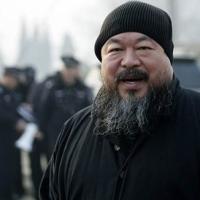
One of China’s most prominent artists Ai Weiwei has been seized and detained by state security agents as he was about board a flight to Hong Kong at Beijing airport on Sunday 3 April.
Police later raided Ai’s studio in the capital city and have detained eight of his staff. Computers, discs, notebooks and other materials were confiscated from the Beijing studio. The artist’s wife is also reportedly under house arrest.
Ai is known as an outspoken critic of the ‘communist’ dictatorship. He is a liberal and an initial co-signatory of Charter ‘08, the bourgeois pro-reform manifesto whose main author Liu Xiaobo is serving an 11-year prison sentence for ‘subversion’. Ai and his co-thinkers later distanced themselves from the charter on the grounds of Liu’s pro-US stance (such as supporting the wars in Afghanistan and Iraq). Liu Xiaobo was awarded the Nobel Peace Prize in October.
“Chilling” crackdown
Amnesty International described the arrest of Ai Weiwei and the ongoing crackdown as “chilling”. As chinaworker.info has reported, China is in the throes of the most severe police crackdown for a decade or more. The starting point for this crackdown can be traced back to the 2008 Olympic Games and the onset of the global capitalist crisis, which has hugely affected China.
Ironically, capitalist politicians and commentators worldwide – with differing levels of sincerity – heavily promoted the Olympic Games as a way to “democratise” China. A most telling fact is that since 2008, China’s internal security budget has ballooned to a staggering 624 billion yuan (US$95 billion), which for the first time exceeds its military budget!
In recent weeks state repression has reached new levels. The one-party regime has reacted with a massive show of force to a series of online calls for anti-government protests that first surfaced in February in response to the revolutionary upheavals in the Arab world. These appeals for a “jasmine revolution” in China have so far produced only minor gatherings. More significant than the mobilisations – or lack thereof – has been the regime’s response, deploying tens of thousands of uniformed and plain-clothes police to disperse any potential crowds. This underlines the regime’s insecurity, having seen formerly “stable” autocratic strongmen toppled by mass movements in Egypt and Tunisia, while revolutionary movements continue to develop in up to a dozen other countries in the region.
In the past six weeks, since the anonymous calls for “jasmine rallies” began circulating, 26 human rights lawyers, bloggers and activists have been arrested, 30 have disappeared and are believed to be in detention, and 200 have been placed under “soft detention,” meaning their movements are restricted, according to the Hong Kong-based group Chinese Human Rights Defenders.
“In the context of the democratic uprisings taking place in the Middle East and North Africa, the Chinese government, fearful of its own people, is counting on getting away with staging one of the most repressive campaigns in more than a decade because of the international community’s preoccupation with events elsewhere,” this organization said in a statement.
Escalation
Ai’s detention is a significant escalation of this crackdown. The Chinese state seems to be targeting and making an example of prominent figures as a deterrent to others. Last week, three dissidents were formerly charged with “subversion”, for which the punishment is increasingly harsh terms of imprisonment. In mid-March well-known dissident Liu Xianbin was sentenced to ten years in prison – a particularly vindictive sentence, almost equalling the monstrous 11-year term served upon Liu Xiaobo. Liu Xianbin has already spent many years in prison for the “crime” of writing articles critical of the government.
Ai is the most high-profile activist to be detained. He was the artistic director for the iconic “Bird’s Nest” Olympic Stadium (but later became openly critical of the Games). Last year he staged an exhibition at London’s Tate Modern gallery. His father, Ai Qing, was one of China’s most famous modern poets. For these reasons, given his global profile, the Chinese dictatorship has until now held its security forces back from an open move against Ai. Official displeasure has been manifested more indirectly through the closure of his Shanghai studio last year – over a legal technicality – and a vicious beating he suffered in 2009 during a visit to Sichuan, site of the massive 2008 earthquake.
“Holding Ai Weiwei takes this [the crackdown] to another level,” said a spokesperson for Amnesty International in London. “If the authorities are so bold as to grab this world-renowned artist in broad daylight at Beijing airport, it’s frightening to think how they might treat other, lesser known dissidents,” he said.
“History is not on their side”
“The detention of Ai Weiwei is the clearest sign yet that the dictatorship is nervous and determined to crush its critics,” said Jaco of Socialist Action (CWI in Hong Kong). “But as the masses of the Middle East and North Africa have shown, brutality and repression will ultimately fail – history is not on the side of the dictators,” he said.
Socialists and supporters of the CWI, who are also targeted – and increasingly so – in the ongoing wave of repression, call unreservedly for the release of Ai Weiwei and all those who are being detained and harassed for expressing opposition to China’s dinosaur autocrats. Protests will be organised in many places outside China and we urge socialists and worker activists to do everything possible to build for these and insure the news is spread.
This is despite our political differences, which are not small, with the supporters of Charter 08 and other liberals over how to achieve genuine democratic rights. These can only be achieved by mass struggle – not deals with the regime (the charter advocates a gradual and staggered implementation of elections for government) – and through the creation of independent and democratic mass organisations especially of the working class, linking the struggle against dictatorship to the struggle against capitalism.


Be the first to comment